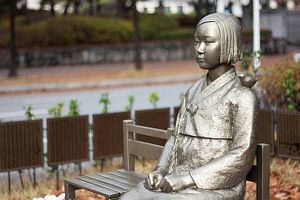In December 2015, Japan and South Korea signed a landmark agreement over Japan’s wartime sexual exploitation of Korean women (“comfort women”). Japan apologized and contributed 1 billion yen (approximately $8.3 million) to compensate the survivors or their families. In return, Korea would consider the issue settled and dialogue with civic groups to remove a comfort woman statue in front of the Japanese embassy in Seoul.
However, the agreement has received low public support and fierce resistance in Korea. On December 28, 2016, protesters placed a new comfort woman statue outside the Japanese consulate in Busan. Japan responded by temporarily withdrawing its ambassador and consul general and suspending Korea-Japan talks on currency swaps and other non-security issues.
The failure is attributed to various factors, but the key is that the two governments agreed on the solution (i.e., apology and compensation), without basic agreement on the root causes (i.e. what Japan is apologizing for). Korea claims that young women and girls were forced against their will to work as sex slaves, whereas Japan cites lack of evidence that its military forcibly recruited Korean women. Japan apologized and compensated for the general suffering of the comfort women, but not for the specific act of forcible enslavement. Until this happens, Korean protesters consider any apology incomplete.
The gulf in historical understanding between Korea and Japan frustrates American policymakers. It also poses a puzzle for political theorists who predict cooperation among liberal democracies. To explain this puzzle, I discuss two competing approaches to history.
The first is the liberal academic tradition, which valorizes the autonomy of individuals to research and to publicize their findings. History is rarely a simple conflict of good and evil, and vigorous, open debate contributes to understanding and reconciliation. The liberal approach contributes to nuanced understanding of the past, such as between Japan and the United States and Japan and its former colony Taiwan. French and German scholars have gone a step further, with a joint history textbook.
An alternative approach sees history as a dichotomous conflict between good and evil, and demands conformity to this truth. The Chinese government, for example, dramatizes the wartime depredations of the Japanese military and ignores acts of Chinese aggression against others (e.g. the 1950 occupation of Tibet) or against its own citizens (the 1989 Tiananmen protesters). The historical narrative shapes historical fact. For example, China proclaims that 300,000 people were killed in the 1937 Nanjing Massacre, and this historical truth is not publicly disputed by any mainland scholar. Japan replies that it is “difficult to determine the concrete number of victims,” and historians outside of China offer various estimates, from tens of thousands up to 200,000.
Japan also has a longstanding tradition of viewing itself as a victim of hostile powers, such as white Westerners in the early 20th century and communist China today. But this Manichean tradition is vigorously opposed by Japanese liberal and left-wing academics, journalists, and civic groups, who research and publicly debate the country’s war record.
South Korea’s path to liberalization has started more recently, including the transition to a civilian-dominated government in 1992. Some academics and media vigorously challenge the older, militarist narrative of heroic South Korea and the United States, by highlighting early popular support for the North Korean regime and American massacres of Korean civilians. However, one narrative remains unchallenged: that of Japanese enslavement of Korean women. In the 2016 movie Spirits’ Homecoming (귀향), Korean girls are kidnapped, abused, and killed, their bodies burned (to destroy evidence) by Japanese soldiers. In making the film, director Cho Jung-rae relied on the oral testimony of one comfort woman and cast Korean actors to portray Japanese; he did not cast Japanese actors or seek corroborating evidence from other survivors. Homecoming was widely praised in Korea and received the 21st Chunsa Film Art Awards for most popular film.
The Homecoming-style narrative (e.g., kidnapping, enslavement, and murder) is disputed by academics elsewhere. According to San Francisco State Professor Sarah Soh (author of the book The Comfort Women), women initially offered various explanations for working at comfort stations, such as supporting their families economically or escaping overbearing parents. Some women suffered abuse; others experienced more supportive conditions. Soh argues that all the women should freely share their experiences, without pressure to conform to the nationalist, anti-Japan narrative. She gives voice to the many types of comfort women, including the 61 who accepted the 1994 Asian Women’s Fund and were therefore branded traitors by activists.
Soh remains largely unknown among Koreans, because no publisher has translated her English-language book. In 2013, Sejong University professor Park Yu-ha published a Korean-language book (Comfort Women of the Empire) with findings broadly similar to Soh’s. A Seoul court partially censored Park’s book and fined her 90 million won ($74,000) for defaming survivors of enslavement. Prosecutors also requested a three-year jail sentence. The censorship extends to foreign academics as well. One foreign professor discussed the Soh book in courses on domestic and international politics. In December 2016, some student activists reported this to the student government and the media. The professor had his job contract suspended as the university investigated claims that he supported Japanese war crimes.
If professors are punished for publishing or even discussing contrary findings on the comfort women issue, this limits academic freedom and democratic debate. Asia is increasingly divided between the forces of individual liberty and of nationalist conformity. The continuing trial of Professor Park Yu-ha will help shape South Korea’s future path.
Joseph Yi is an associate professor of political science at Hanyang University (Seoul).

































